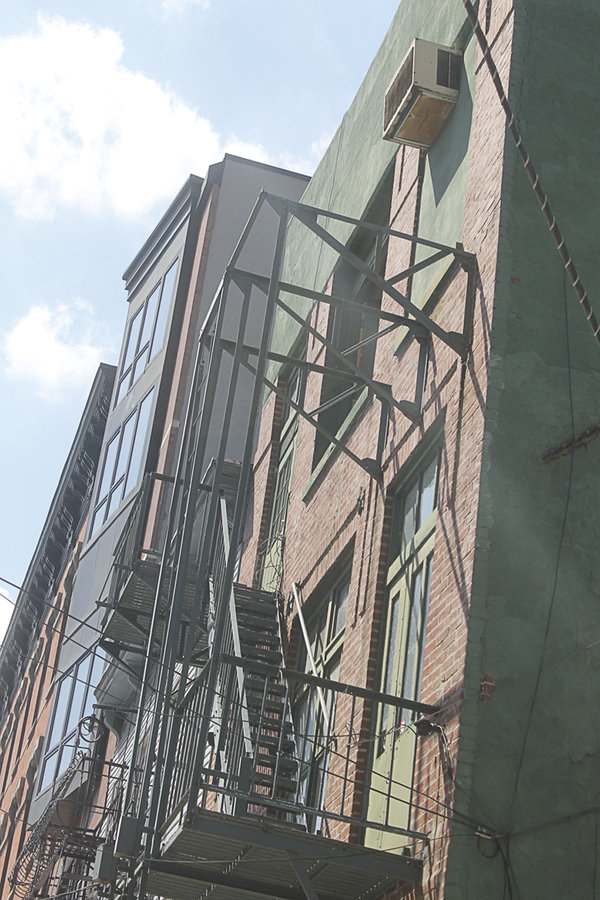The City Council will soon require owners of buildings with four stories or more to have their fire escapes inspected every five years. A new ordinance was introduced Tuesday, partly because many fire escapes in existing buildings have not been inspected for 75 to 100 years, and some pose eminent risk to residents, firefighters, and the general public.
Fire Official Darryl DeMott told the council that in one case, firefighters responded to a fire and the steps of a fire escape collapsed. In another, a 74-year-old man tried to pull down the ladder to a fire escape only to have the 75-pound counterweight fall on his head.
The city estimates that nearly 9,000 buildings around the city need inspection, most of which have fire escapes.
The state is supposed to conduct inspections every five years and insurance companies often require inspections as well. DeMott told the council that neither does an adequate job. He said in some inspectors barely glance at structural reports on buildings before approving the property.
The ordinance requires property owners to conduct the inspection, and according to Councilwoman Diane Coleman, the property owner would benefit from doing a thorough job, because “If someone gets hurt, the property owner would be responsible.”
Councilman Richard Boggiano said he is wary of the ordinance because he foresees abuse by repair people who might ask to do unnecessary work. DeMott, however, said inspectors and repair people would have to be certified.
The city checked with two inspectors locally and estimated the cost of an inspection to be about $250.
“If someone gets hurt the property owner would be responsible.” – Diane Coleman
____________
While there are a number of companies that provide inspection services, Councilmember Candice Osborne said, the city should give property owners a grace period that would allow them to comply but would not cause a backlog.
The ordinance gives property owners until Dec. 31, 2016 to comply.
“Since many of these have not been inspected for 100 years, waiting until the end of the year would not be a problem,” DeMott said.
City to untangle permit process
City officials admit that getting a permit of any kind for nearly anything is “cumbersome and disjointed.” This is partly because the process is paper-based, and people have to fill out forms.
But it goes beyond this. Often permit applicants can’t simply go to one department to get approvals but have to visit a series of offices.
For this reason, the council will use a grant to hire a consultant to study the permit process web and recommend a program that will untangle it.
“The worst offender is the Building Department,” said Osborne said. “You go to the Building Department. They tell you to do this or that. You do those things, and then you come back and they have four more things for you to do.”
The city is hoping to develop a web-based system that will allow an applicant to go on line, find out what information they need or fill out forms required, all in one sitting.
Osborne said this would be similar to a process currently used by the city’s Office of Cultural Affairs, where an applicant goes to one office and is helped through the rest of the requirements.
City to review process for off-duty cop assignments
After finding that the city has been losing money paying supervisors for off-duty police assignments, the council has agreed to raise the fees that residents pay to the city.
Projects that require streets or sidewalks to be dug up require that an off-duty police officer be hired as part of the permit process. Property owners pay the fee to the city, and the city pays the police. Also included is the cost for police supervisors who make sure the off-duty cops are doing their job. Officers are offered this additional work as part as part of an agreement with police unions. The city will pay supervisors about $12 more an hour, raising their pay from $55 to about $67. But they will be required to oversee more job sites.
Yun, however, said the cost of cops and supervisors may be too much of a burden for small businesses and not-for-profits. He suggested the city seek some kind of discounted fee.
Council President Rolando Lavarro said the council might establish an exception in some situations.
“Like a church discount,” Boggiano said. “This would help senior citizens and others on fixed incomes.”
Ward F Councilmember Diane Coleman said the fee could be a burden for low-income residents and said that the fee should be income-based.
“A person shouldn’t have to use a whole Society Security check to pay the police,” she said.
Business Administrator Robert J. Kakoleski said the lower fees may prevent some jobs from getting police coverage since officers may not want to work off-duty for a lower salary.
Osborne said smaller projects in New York City do not use off-duty police at all, and suggested a similar arrangement might be made in Jersey City
“This should be based on public safety, not on income,” she said. “If it’s needed for public safety we should have an officer. If not, then we shouldn’t.”
Yun said this is particularly true on projects along side streets, and suggested the city look into using lower cost crossing guards in some instances.
Al Sullivan may be reached at asullivan@hudsonreporter.com.
